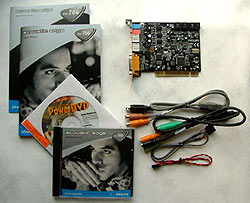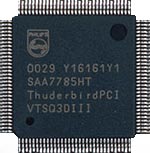Philips Acoustic Edge
PSC706 Review
Like owning a super fast processor, good sound is not something you should
ever skimp on. After all, would anyone worth their weight in salt spend the time
and effort building the ultimate gaming machine to only hook up a lousy
pair of computer speakers?! I think not. If you are
fragging at high FPS, then you should be listening to where
your enemies are coming from, not just watching on the screen.
To get the best from your games, and indeed from your DVD player
should have one, 5.1 channel audio is a must. Once such offering
that doesn't bear the name of Creative Labs is Philips Acoustic
Edge - PSC706, and let me assure you this card is set to blow your mind
from right from the box!
| Philips Acoustic Edge PSC706
|
- Configuration (5.1-Channel)
- Qsound 3D Interactive
- Qsound Environmental Modeling
- Qsound Multi-Speaker System
- 3D Audio Streams (96)
- Qsurround playback
- DirectSound Accelerations (256)
- DirectInput Devices
Comes with...
- Instructions
- Drivers/Software CD
- Analog Audio Cable to CDROM
- Line out cable, S/PDIF
cable
|
 |
 What set's the Acoustic Edge apart from
other audio accelerators like the Sound Blaster Live! is the
processor. This Phillips card comes equipped with the
very functional Thunderbird Avenger audio accelerator chipset. What set's the Acoustic Edge apart from
other audio accelerators like the Sound Blaster Live! is the
processor. This Phillips card comes equipped with the
very functional Thunderbird Avenger audio accelerator chipset.
The SAA7785 ThunderBird Avenger is the PCI audio
accelerator that drives the PSC706, making it ideal for use in home theatre,
surround sound gaming, and MP3 music playing. For example, we have been testing
out the Acoustic Edge in an MP3 server for a few weeks - putting it through a
gauntlet of different styles of recorded music to see how it fares.
The
ThunderBird Avenger comes packing QSound and advanced QMSS which also gives it
the abilities to transform ordinary stereo games and music into 5.1 speaker
output. With its integrated S/PDIF OUT, the Acoustic Edge can be connected to a
standard home stereo system. With its S/PDIF IN jack audio can be piped into a
computer for editing or CD-to-MP3 ripping for example. "The ThunderBird
Avenger chipset itself supports redirection of up to 5.1 streams from PCI to USB
or IEEE 1394 devices. Full hardware acceleration of DirectSound, 3D audio, music
synthesis and game port functions provides increased graphic frame rates and
industry leading low CPU consumption."
- 2, 4, or 5.1 speaker and headphone 3D algorithms
- QSound3DInteractive interactive positional 3D
- QSound Multi-Speaker System stereo to quad or
stereo to 5.1 processing
- QSound Environmental Modeling (I3D Level 2.0,
EAX 1.0/2.0 compatible)
- QXpander and stereo-to-3D remapping
- Integrated S/PDIF OUT and optional S/PDIF IN
- AC3 5.1 or stereo playback through S/PDIF output
- Processing up to 512 simultaneous inputs including 256 DirectSound streams
and up to 96 concurrent CD quality 3D streams
- Redirection up to 5.1 streams from PCI to USB or IEEE 1394 devices via 14
Channel Virtual Write Master
- Superior hardware acceleration for minimum CPU consumption
- Broadest API compatibility including
DirectSound3D, EAX, and A3D
- 64 hardware wavetable polyphony
- Professional soft-synth with 256 voice polyphony and XG support
- Second generation ActiMedia programmable DSP architecture
- Global reverb for external digital and analog input sources
- Enhanced MIDI reverb and chorus (per track and global)
- Independent I²S input and output ports
- Comprehensive Real Mode DOS and DOS win-dows support
- Dual gameport accelerator with legacy and digital joystick modes
- PC/PCI, DDMA, and LAM PCI DMA support
- Supports quad and dual AC97 CODECS
- 3.3 v operation with 5 v tolerant I/O
- Windows 95, Windows 98, and Windows 2000 drivers
- Complete audio subsystem when combined with AC97 CODEC
- PC sound cards and motherboards
- Video games and other PCI bus-based multimedia applications
|
|

